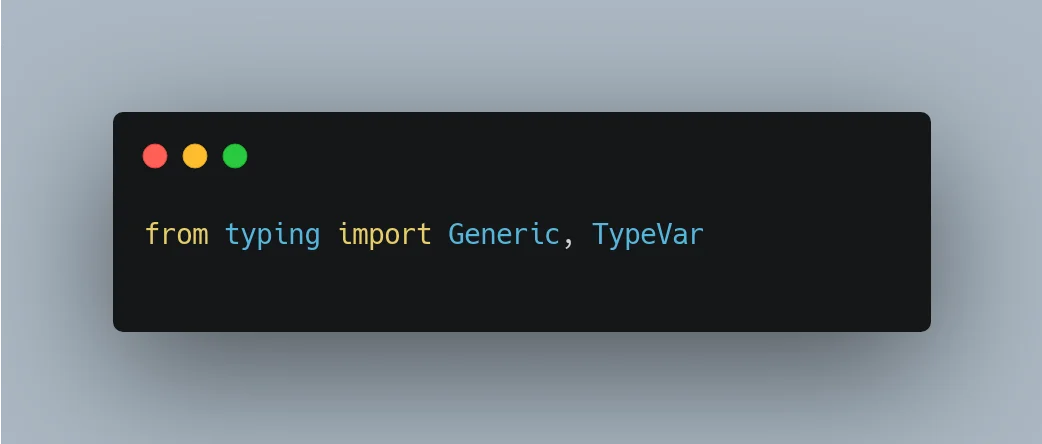Python type annotation improvement with Generic and TypeVar

In this article, I would like to share my favorite way of type annotating classes using typing modules with Generic and TypeVar.
Checker installation
First, to check python typing you can use mypy library or any IDE/editor with type checker like Pycharm.
pip install mypy
Generic
It is an abstract base class for generic types. A generic type is typically declared by inheriting from an instantiation of this class with one or more type variables
TypeVar
It is a type variable. Type variables exist primarily for the benefit of static type checkers. They serve as the parameters for generic types as well as for generic function definitions.
Showcase
As an example, we will build a base class for our database repository, and then we will use it.
First, let’s define our base repository:
import abc
from schemas.base import BaseSchema
from tables.base import BaseTable
class BaseRepository(metaclass=abc.ABCMeta):
@property
@abc.abstractmethod
def _schema(self) -> Type[BaseSchema]:
...
@property
@abc.abstractmethod
def _table(self) -> Type[BaseTable]:
...
def create(self, schema: BaseSchema) -> Type[BaseTable]:
table = self._table(**schema.__dict__)
return table
Now, let’s build the test repository:
from schemas.base import BaseSchema
from tables.base import BaseTable
@dataclass()
class UserSchema(BaseSchema):
id: int
name: str
@dataclass()
class UserTable(BaseTable):
id: int
name: str
class UserRepository(BaseRepository):
@property
def _table(self) -> UserTable:
return UserTable
@property
def _schema(self) -> UserSchema:
return UserSchema
def perform_create(self) -> UserTable:
schema = UserSchema(id=1, name="Piotr")
return self.create(schema)
The problem with the above code is that every time we want to run the create method it will return the BaseTable type.
You will see the error:
Expected type 'UserTable', got 'BaseTable' instead
We can fix this by introducing TypeVar with Generic:
import abc
from typing import TypeVar, Generic
from schemas.base import BaseSchema
from tables.base import BaseTable
SCHEMA = TypeVar("SCHEMA", bound=BaseSchema)
TABLE = TypeVar("TABLE", bound=BaseTable)
class BaseRepository(Generic[SCHEMA, TABLE], metaclass=abc.ABCMeta):
@property
@abc.abstractmethod
def _schema(self) -> Type[SCHEMA]:
...
@property
@abc.abstractmethod
def _table(self) -> Type[TABLE]:
...
def create(self, schema: SCHEMA) -> TABLE:
table = self._table(**schema.__dict__)
return table
New implementation of the UserRepository should inherit now from the base with the definition of the types we want to use:
from schemas.base import BaseSchema
from tables.base import BaseTable
@dataclass()
class UserSchema(BaseSchema):
id: int
name: str
@dataclass()
class UserTable(BaseTable):
id: int
name: str
class UserRepository(BaseRepository[UserSchema, UserTable]):
@property
def _table(self) -> UserTable:
return UserTable
@property
def _schema(self) -> UserSchema:
return UserSchema
def perform_create(self) -> UserTable:
schema = UserSchema(id=1, name="Piotr")
return self.create(schema)
Introducing the above change we are eliminating the error and making code cleaner and better type hinted.
Summary
This is one of many cases where this approach can be used. Feel free to experiment and play on your own. I have already used it in my previous tutorial on the example with SQLAlchemy, FastAPI, and Pydantic, check it on my github.